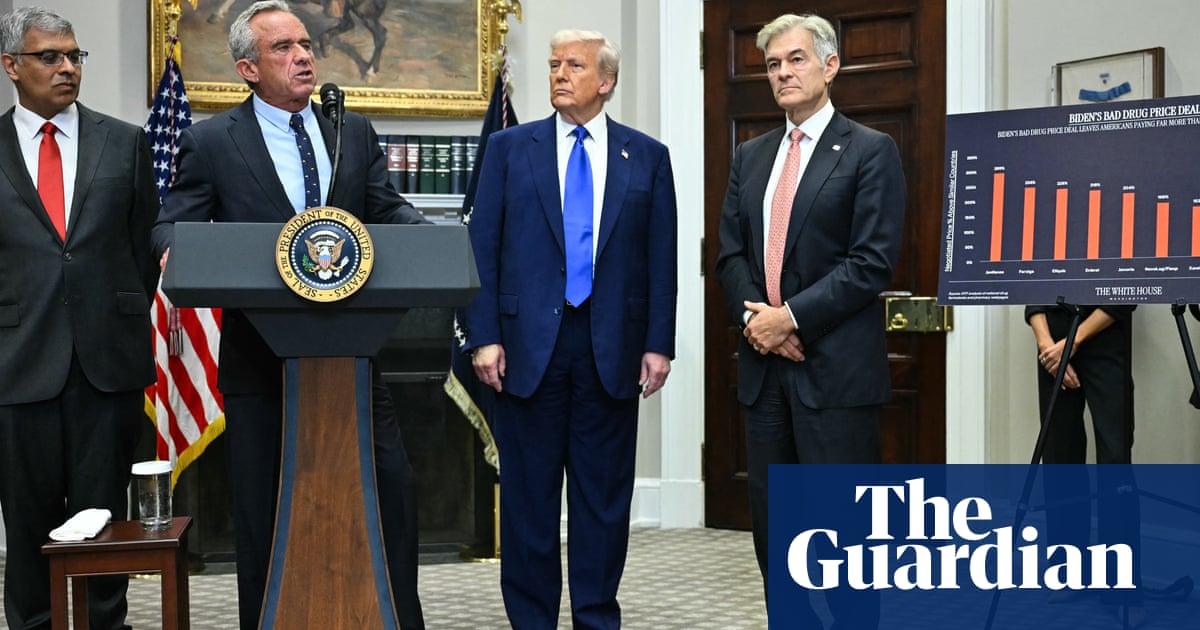The White House is unveiling an aggressive drug pricing strategy targetingpharmaceutical companies, promising to dramatically cut prescription drug costs for American consumers.
Donald Trumpcondemned the current pricing system as a “redistribution” that has allowed drugmakers to exploit US patients, saying he will sign an executive order that would match lower drug prices abroad.
“We are subsidizing others’ healthcare, where they paid a small fraction of what we pay,” the president said in a press conference on Monday, flanked by health and human services secretaryRobert F Kennedy Jrand centers for Medicare and Medicaid services administrator Mehmet Oz.
“Even though the United States is home to only 4% of the world’s population, pharmaceutical companies make more than two-thirds of their profits in America,” Trump said. “That’s not a good thing.”
Examples Trump pointed to included how a single breast cancer drug costs $16,000 in the US, but just $1,600 in Australia, and how the weight loss drug Ozempic costs 10 times more in the US than in other developed countries.
“We’re no longer paying 10 times more than another country,” he said.
The proposed policy, dubbed as “most favored nation”, would force pharmaceutical companies to match the lowest global prices, in effect ending what Trump describes as systematic overcharging.
The new order aims to level the global pharmaceutical playing field, with Trump suggesting that “Europe’s going to have to pay a little bit more” while Americans will pay “a lot less”.
Kennedy also backed the plan from the podium, saying that this is a policy that American progressives should get behind.
“I have a couple of kids who are Democrats or big Bernie Sanders fans, and when I told them that this was going to happen, they had tears in their eyes,” Kennedy said. “They thought this is never going to happen in our lifetime.”
Trump is expected to sign the order early next week.
During the final months of his first term, theTrump administrationsought to push through a “most favored nation” plan, which would have tied reimbursements for 50 drugs by Medicare to the lowest prices paid by certain other countries.
A federal judge blocked the effort after ruling that the administration had failed to give the public a chance to comment, in violation of federal law. The Biden administration later rescinded the proposal under pressure from hospitals and drug companies.
Trump’s order, if implemented this time, would likely draw strong opposition from the pharmaceuticals industry, which has argued that it would result in Medicare patients losing access to vital care.
Sign up toThis Week in Trumpland
A deep dive into the policies, controversies and oddities surrounding the Trump administration
after newsletter promotion
Shares of US drugmakers fell in extended trading after Trump teased the announcement last week, Reuters reported. One drugmaker executive told the news agency that the plan was the biggest “existential threat to the industry and US biosciences innovation”.
But health policy experts support the plan, NBC Newsreported,arguing that drug companies should be forced to match the prices they give other countries. However, they doubt the proposal would withstand the fresh legal challenges likely to arise.
The US paid two and seven-tenths times more for all drugs in 2022 than other wealthy, developed democracies, and three and two-tenths times more for brand-name medications, the Rand Corporationfound.
Peer countries pay less for drugs because they negotiate directly with drug companies. Because they provide their citizens with universal health coverage, they can act as gatekeepers – and that gives them leverage.
Pharmaceutical companies have long defended high US prices as necessary for research and development. Trump dismissed this argument on Monday, calling it a long-running con: “They did one of the greatest jobs in history for their company, convincing people this was a fair system.”
The US Department of Health and Human Services did not immediately respond to a request for comment.
